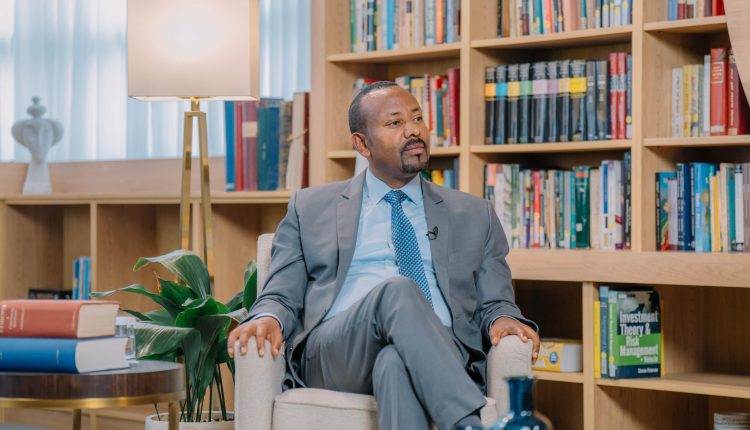Premier touts the country’s tangible and visible transformation
Addis Ababa, June 06, 2025 (FMC) — Prime Minister Abiy Ahmed of Ethiopia, in a televised interview, emphasized that his country is experiencing a highly visible and tangible transformation across multiple sectors.
In the interview, the Prime Minister provided a brief explanation of his government’s bold and ongoing measures to stabilize the cost of living and stimulate economic growth. Describing the wide-ranging reforms carried out over the past six years, he noted that while there have been persistent challenges, the country has made significant progress in many areas.
He said these reforms—anchored in a shift toward more democratic governance, economic liberalization, social transformation, and modernization—have brought about unprecedented success stories.
The Prime Minister explained that comprehensive economic reforms aimed at addressing structural imbalances are already yielding positive results. One of the key achievements, he pointed out, is in the area of exports. While Ethiopia earned only 7.5 billion US dollars in total export revenues between the 1992 and 2006 Ethiopian budget years, the country is now projected to generate over 8 billion US dollars in export income in the current fiscal year alone.
Addressing the government’s ongoing measures to stabilize the cost of living, Prime Minister Abiy acknowledged that inflationary pressures stem from a complex mix of long-standing structural issues, natural and man-made challenges, as well as global economic disruptions. However, he noted a significant drop in inflation—from 34 percent to 13.5 percent—as a result of sustained reform efforts, including macroeconomic initiatives.
He described this as a sign of economic recovery, and added that improvements in income levels, poverty reduction, and reductions in GDP arrears are further indications of Ethiopia’s economic stabilization. The Prime Minister also emphasized that reforms across multiple sectors are laying the groundwork for a more prosperous and self-reliant future. These efforts, he said, are intended to reduce the debt burden and ensure a sustainable economic environment for future generations.
“Ethiopia is recovering from its past ailments and is now on a path to renewal,” the Prime Minister remarked. He urged all stakeholders to remain committed and work collectively to sustain and build upon the progress achieved. “It is the shared responsibility of all citizens and institutions to safeguard and advance the change we have brought about,” he concluded.
Expanding on the government’s multi-sectoral initiatives that are fueling economic and development gains, Prime Minister Abiy highlighted that Ethiopia’s diversified development approach is producing measurable outcomes. He explained that lasting prosperity cannot be achieved by relying on a single sector, which is why the government has adopted a broad-based, multi-sectoral strategy to drive sustainable growth.
As part of this strategy, he said agriculture, industry, mining, tourism, and Information and Communications Technology (ICT) have been prioritized as the key pillars. Acknowledging the country’s vast potential in each area, the Prime Minister stressed the importance of sound policy implementation and the unique value of each sector in supporting integrated development.
“This approach is already bearing fruit,” he said, citing notable improvements in agricultural productivity, industrial output, mining exports, tourism growth, and the uptake of digital technologies.
Using the industrial sector as an example, the Prime Minister said that significant gains have been made. Industrial production capacity has increased from 48 percent before the reforms to 65 percent currently. The number of operational industrial parks has also grown from three to thirteen, most of which are now active.
“We have revitalized the industrial sector by constructing industrial parks, enabling investor ownership, and establishing free trade zones,” he explained, projecting a 13 percent growth in the industrial sector for the 2024/2025 budget year. He further emphasized that the service sector remains “the backbone and delivery mechanism” of the country’s economic progress.
The Prime Minister also pointed to ongoing reforms, particularly in the financial sector, aimed at modernizing and streamlining service delivery. “By integrating major sectors with supportive fields, we are achieving multiple, interconnected results,” he stated, adding, “This holistic approach is accelerating our national development and shaping a prosperous future for Ethiopia.”
Turning to Ethiopia’s context-driven macroeconomic reform, the Prime Minister described the initiative as rooted in the country’s unique realities while drawing valuable lessons from global experience. He said the reform was born out of national self-reflection and a critical evaluation of Ethiopia’s economic structure, supplemented by consultations with both domestic and international stakeholders.
He emphasized that Ethiopia’s homegrown economic reform does not reject external knowledge but rather incorporates international best practices tailored to national needs. He explained that insights from countries that have successfully navigated economic reform have been adapted to Ethiopia’s specific context.
“Ethiopia’s homegrown economic reform doesn’t mean we’re closed off from learning from others,” he noted, rejecting claims that the reform simply copied foreign models as “inappropriate.”
The Prime Minister also referenced ongoing negotiations with the International Monetary Fund (IMF), the World Bank, and other creditors regarding Ethiopia’s external debt, noting that these talks are guided by national interests.
In conclusion, Prime Minister Abiy reiterated that the country’s macroeconomic reform program is a product of Ethiopia’s unique situation, enhanced by international experiences and aligned with the nation’s long-term developmental vision.

